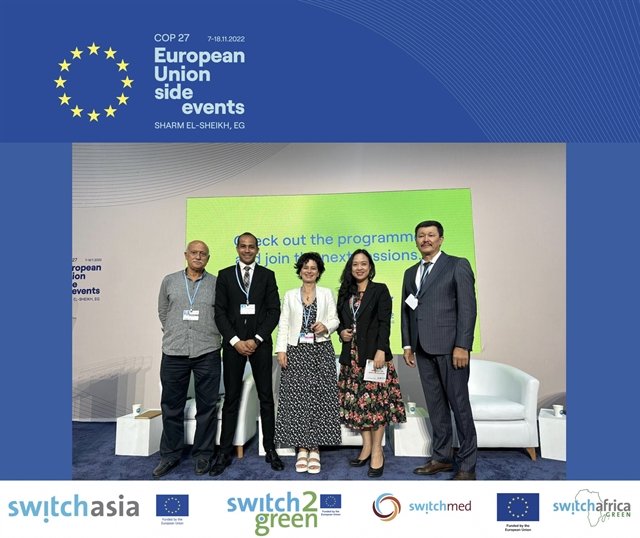Eco-fair project contributes to reduce carbon emissions
 |
| Panelists at EU Side Event, COP27. Photo courtesy of VIRI |
HÀ NỘI — How Eco-Fair project is making significant contributions towards a circular economy and other policy approaches accelerate the transition of the agri-food value-chain to a low-carbon industry in Việt Nam was highlighted in a seminar within the COP27 framework.
Dr. Nguyễn Bảo Thoa, director of the Việt Nam Rural Industries Research and Development Institute (VIRI) who was leading the EU-funded SWITCH-Asia “Promotion of supply and demand of Eco-Fair Agri-food processing products in Việt Nam” (Eco-Fair) project, was invited at COP27 to be a key speaker at the EU Pavilion during a side event titled “Recipes for Change: How a sustainable food system can curb carbon emissions.”
She showcased examples of low-carbon agri-food enterprises that benefitted from the project’s support; and ways in which the project is engaging youth and the general public and promoting low-carbon nutrition and lifestyles.
Implemented during 2020-23, the Eco-Fair project is led by VIRI in partnership with the Centre for Creativity and Sustainability (CCS), Funzilife Oy Co Ltd (Funzi), and the Việt Nam Cleaner Production Centre Company (VNCNC).
The project’s objectives include the promotion of sustainable production and consumption of eco-fair agri-food processing products in Việt Nam, contributing to economic prosperity and poverty reduction, and the development of sustainable livelihoods and a green economy for a transition toward a low-carbon, resource-efficient and a circular economy.
These objectives are in line with the Green Growth Strategy and the sustainable development orientation of the Vietnamese Government. Many case studies have been so far drawn from Eco-Fair, a project which has attracted robust support and commitment from diverse stakeholders including Government agencies, professional associations, business organisations, financial institutions and particularly micro and small-and-medium sized enterprises (MSMEs) in the value chain.
In the path towards supporting the development of a climate-resilient agri-food sector in Việt Nam, agri-food enterprises and co-operatives that have been supported by Eco-Fair managed to save costs and energy (10-15 per cent per year); transform solid wastes into composition fuel; transform organic wastes into organic fertilisers or animal feed; generate biochar through VCBG technology; and transform various agricultural by-products into valuable products.
The Bản Luông Co-operative, in the northern province of Bắc Cạn, for example, was enabled to significantly reduce solid waste from galangal processing, create a good source of high protein feed for chickens and an effective source of fertiliser for growing organic vegetables on the farm.
The Trại Lâm Noodle Co-operative (in Bắc Giang Province) is another beneficiary of the Eco-Fair project. They use the litchi tree branches, which must be pruned every year in the Lục Ngạn litchi growing area, as the fuel source for boiler combustion.
The cooperative uses solar energy for product drying which saves up to 10-15 per cent of energy. Waste products are recovered as animal feed. Similarly, the Tota company (in Đắk Nông Province) uses the greenhouse solar dryer to reduce the product damage ratio to less than 1 per cent. Moreover, the use of VCBG technology household stoves has generated 300 kilos of biochar per year on average for soil improvement, reducing 770 kilos of carbon equivalent by burying the biochar into the soil.
With more than 80 people registered online and 30 people attending the EU Pavilion on-site, Carla Montesi, Directorate for Green Deal and Digital Agenda, EU Directorate-General for International Partnerships showcased the European Union’s support in this transition underpinning goals of the EU Circular Economy Action Plan and the Farm to Fork Strategy. — VNS
(Source: https://vietnamnews.vn/economy/1396875/eco-fair-project-contributes-to-reduce-carbon-emissions.html)







